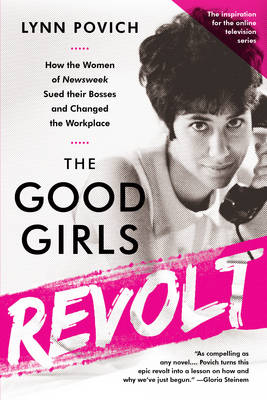
It was the 1960s--a time of economic boom and social strife. Young women poured into the workplace, but the "Help Wanted" ads were segregated by gender and the "Mad Men" office culture was rife with sexual stereotyping and discrimination.
Lynn Povich was one of the lucky ones, landing a job at Newsweek, renowned for its cutting-edge coverage of civil rights and the "Swinging Sixties." Nora Ephron, Jane Bryant Quinn, Ellen Goodman, and Susan Brownmiller all started there as well. It was a top-notch job--for a girl--at an exciting place.
But it was a dead end. Women researchers sometimes became reporters, rarely writers, and never editors. Any aspiring female journalist was told, "If you want to be a writer, go somewhere else."
On March 16, 1970, the day Newsweek published a cover story on the fledgling feminist movement entitled "Women in Revolt," forty-six Newsweek women charged the magazine with discrimination in hiring and promotion. It was the first female class action lawsuit--the first by women journalists--and it inspired other women in the media to quickly follow suit.
Lynn Povich was one of the ringleaders. In The Good Girls Revolt, she evocatively tells the story of this dramatic turning point through the lives of several participants. With warmth, humor, and perspective, she shows how personal experiences and cultural shifts led a group of well-mannered, largely apolitical women, raised in the 1940s and 1950s, to challenge their bosses--and what happened after they did. For many, filing the suit was a radicalizing act that empowered them to "find themselves" and fight back. Others lost their way amid opportunities, pressures, discouragements, and hostilities they weren't prepared to navigate.
The Good Girls Revolt also explores why changes in the law didn't solve everything. Through the lives of young female journalists at Newsweek today, Lynn Povich shows what has--and hasn't--changed in the workplace.
Full Review on: my Blog ThePunkTheory
I hardly ever pick up non-fiction books, but when it comes to The Good Girls Revolt, I felt it was a book I simply had to read.
First of all, I was deeply impressed by the women of Newsweek standing up for their rights in a time when equality was even further away than it is now. They made an important step for all women to come after them. It certainly was a wake-up call for their employers and many others out there.
Lynn Povich chronicles the time building up to the lawsuit, but more importantly the things that changed afterwards - and those that didn't. We get a thorough insight in what it was like to be a working woman in the 1960's and 1970's and what kind of challenges they had to face.
Reading the book, I was humbled by all the achievements and success story that came from the hard work.
But mostly, the it made me sad. Despite the lawsuit (and many other female employees throughout the USA joining in) almost nothing changed. Moreover, when little adjustment were made, it was mostly for show and no real effect was discernible. I can feel the women's anger which makes them even more relatable.
But what left the deepest impression with me are the two chapters about women at Newsweek today. It hits you like a rock when they all realize that after all this time things are still almost the same.
A book every woman should read!
Reading updates
-
Started reading
-
15 April, 2018:
Finished reading
-
15 April, 2018:
Reviewed
-
Started reading
-
Finished reading
-
15 April, 2018:
Reviewed
